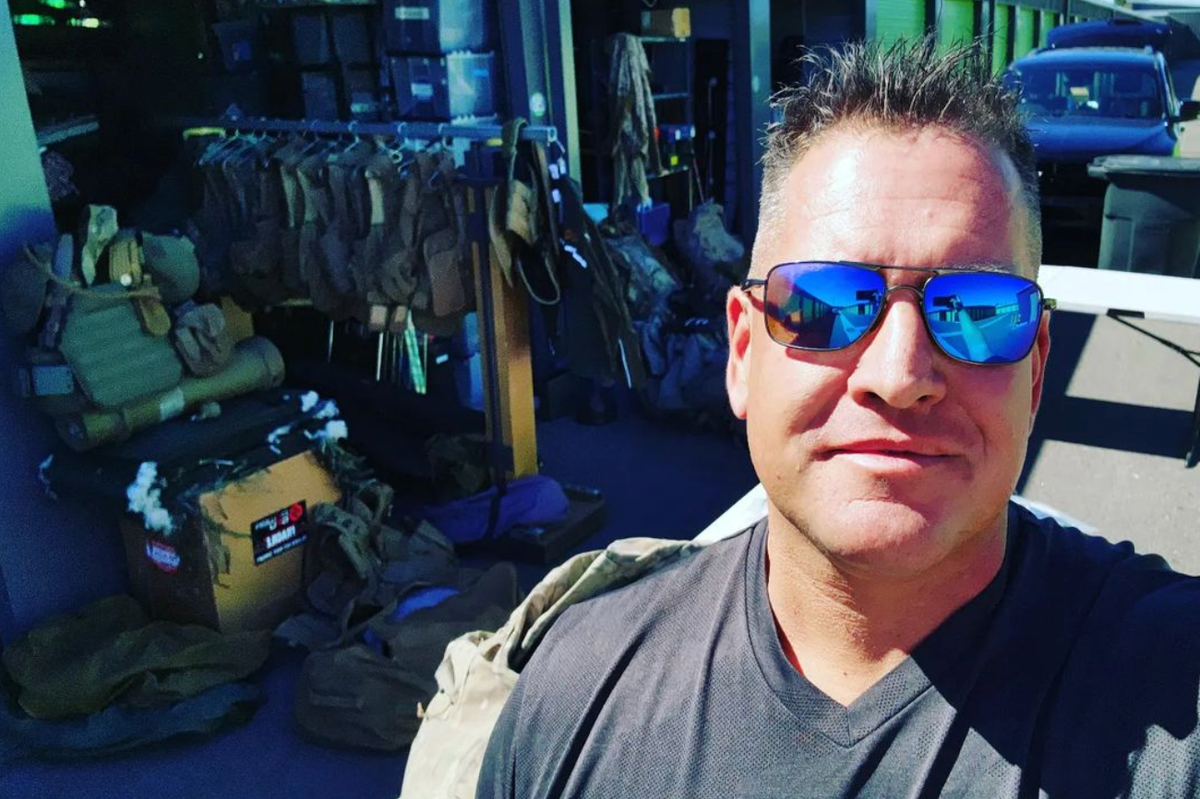How a Hollywood military expert found a creative way to help volunteer soldiers in Ukraine

Being a hero doesn't stop once you're out of the military.
Jon Barton has made a name for himself in Hollywood, but it’s not just for his military expertise. Lots of film and TV sets will hire a consultant to discuss uniforms and weapons in a way that feels more authentic. But that extra bit of magic Barton brings—the special sauce that keeps him working with A-listers like Tom Cruise and Chris Hemsworth—is his compassion.
“I would take the actor and I would put him into a world of his/her military backstory. And I would say, ‘I’m going to teach you what it means to be a marine. Not just how we shoot a gun," he told Upworthy. "I’m going to teach you all the history, the ethos, what it means when we say Semper Fi.’”
That drive for integrity naturally compels Barton to fight for what’s right. After the notorious shooting accident on the set of "Rust," when cinematographer Halyna Hutchins was fatally wounded, Barton addressed the need for better gun safety measures on social media. Namely, he urged the need to hire actual experts, not just armorers.
“For me, it’s personal. I am passionate about keeping people safe. You can’t even come close to an accident,” he said.
Barton continues to put his empathy into action, most recently by donating nearly $1 million worth of tactical supplies to the volunteer soldiers fighting in Ukraine.
The idea came to him, as so many do nowadays, via Instagram.
A friend reached out to Barton asking if he had any medical supplies to donate. Unfortunately, the answer was no, but that led to something even better. The doctor leading the donation asked Barton if instead he had camouflage uniforms or knee pads.
As the owner of Night-Fire Media, a military rental company with a warehouse absolutely full of tactical gear, it “just clicked.”
“I’ve got a whole warehouse of camouflage, uniforms and kneepads, like it made so much sense that I could donate,” he said, adding that uniforms and weapons tend to change colors every couple of years, becoming outdated—and easily usable—quite quickly. But they would be perfect for the volunteer soldiers who have nothing to fight in but civilian clothes.
“I said, ‘how many do you need? I think I can fill your whole plane.'”
Though no actual weapons have been sent (Barton might be generous, but he’s not looking to break the law), hundreds of boxes have been sent containing equally important gear: uniforms, LBEs (load bearing equipment), rifle slings and all kinds of accessories for use in cold weather, including waterproof boots and flame-retardant combat gloves. And though the armor pieces were taken out (again, not trying to get arrested), around 300 military-grade Kevlar vests were also donated.
Barton has given around 80% of his entire inventory, and plans to keep the mission going.
After news of his efforts begun making headlines, Barton opened up his mailing address for others to send items. Both civilians and vets across the country have been inspired to donate things like emergency blankets, sleeping bags and fire-starting kits. One small act of kindness has now taken on new life.
Barton’s sense of purpose comes from simple human empathy.
“As Americans, we should fight oppression and evil wherever it rears its ugly head in the world, if we’re able. I am blown away by the Ukrainian people’s tenacity and their philosophy as war fighters. Above everything else, I think we need to commend that. You know, we're a country that started and we gained our independence by fighting for our freedom. We didn’t do it alone. So I want the Ukrainians to know they’re not alone. We believe in their fight.”
In times of war, heroes emerge in many places, not just on the frontlines. Whether that’s giving time, money or supplies, each time we choose generosity, humanity wins.
If you would like to send any items to Barton, you can mail to:
10866 Washington Blvd. #502, Culver City, CA, 90233
Or, you can send something via Amazon using this wishlist.
- Amid the chaos of war, two Ukrainian soldiers marry each other on ... ›
- Arnold Schwarzenegger makes a plea for peace to the Russian ... ›
- Russian citizens are risking being jailed to protest the war in Ukraine ... ›



 A woman reading a book.via
A woman reading a book.via A woman tending to her garden.via
A woman tending to her garden.via
 A person on Threads makes a typo.Photo credit: Threads/@maureenmzobe
A person on Threads makes a typo.Photo credit: Threads/@maureenmzobe
 Individual impact isn't as inspiring to Gen Z as it was to
Individual impact isn't as inspiring to Gen Z as it was to  Gen Z is much more black and white about behaviors than previous generations.
Gen Z is much more black and white about behaviors than previous generations. 

 Young man holds up his hand to show five.
Young man holds up his hand to show five. Two women having a conversation at a coffee shop.
Two women having a conversation at a coffee shop.  Two women talking as the leave a yoga class
Two women talking as the leave a yoga class